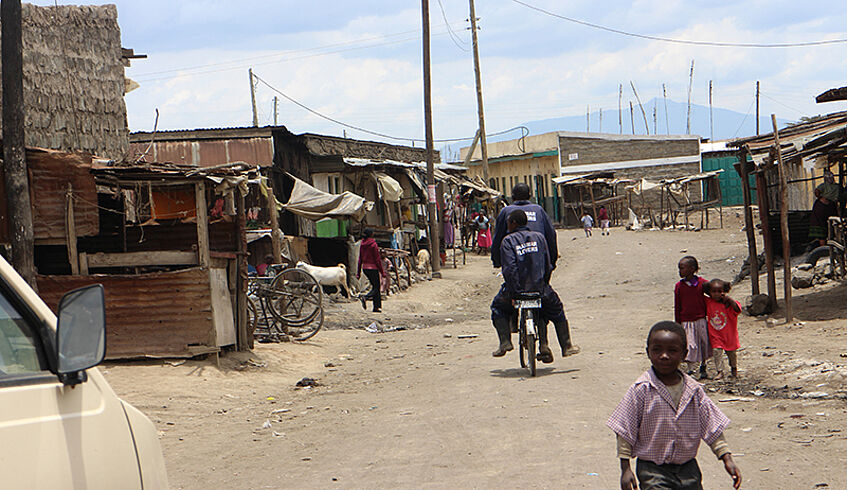
Arbeitersiedlung am Lake Naivasha, Kenia (Quelle: V. Tolo/ RCR)
Trans-local relations and the reorganization of socio-ecological systems in Kenya and South Africa – RCR/B4
Projektleiter: Clemens Greiner (GSSC, Universität Köln), Detlef Müller-Mahn (Geographisches Institut, Universität Bonn), Patrick Sakdapolrak (IfGR, Universität Wien)
Wissenschaftliche MitarbeiterInnen: Vera Tolo (Geographisches Institut, Universität Bonn), Christiane Naumann (Institut für Ethnologie, Universität Köln)
Laufzeit: 10/2013 – 09/2016
Finanziert von der Deutschen Forschungsgemeinschaft (DFG)
Abstract
The central aim of project B4 is to understand the impact of human migration on the social-ecological systems (SES) in migrants’ home areas. These dynamics are highly relevant for the RCR projects’ research areas as well as for the conceptual understanding of social-ecological coupling processes, because livelihoods and natural resource management are highly dependent on influences from outside the locally defined system. Migration is therefore considered a particularly suitable vehicle to decipher the more general mechanisms of resilience, collapse and reorganization in complex SES characterized by intensive cross-scale dynamics. By focussing on the impact of rural-urban migration within pastoralist societies, the project will not only close a knowledge gap, but will also contribute to an understanding of human-environmental relations in Africa’s arid and semi-arid savannah areas that does not follow deterministic arguments.
The project seeks to advance knowledge on the migration-environment-nexus on a conceptual as well as empirical level: Conceptually, the project seeks to develop and synthesize the discussion on two broad topics, which until today remain widely unconnected, namely translocality and social-ecological resilience. Empirically, the project aims to employ the synthesized framework on translocality and resilience through comparative research into rural-urban relations and their role in the re-organization of SES in the Laikipia district (Kenya) and in Kuruman (South Africa). A wide-range of social science research methods will be employed to decipher these interactions, in close collaboration with the projects in cluster A (A1, A2, A4), to address the coupling of social and ecological processes. The focus on two cases enhances a differentiated description and analysis of the migration-environment nexus. While both cases share some similarities (geographical setting, livelihoods system), they exhibit different migration patterns and are embedded in different higher level economic and political settings. The comparative research will enable deeper insights to be gained into the impact of scale transcendent dynamics on the resilience of complex coupled SES.
Resilience, Collapse and Reorganisation in Social-Ecological Systems (SES) of African Savannas (FG 1501)
The research unit (RU) will investigate resilience, collapse and reorganisation in complex coupled social-ecological systems (SES) in Africa. Contemporary research shows that Africa not only is the continent most comprehensively affected by global climatic change and environmental transformations, but that societies, economies and environments are also massively impacted by forces of internal mobility and differentiation, violent conflict, economic globalisation and global environmental governance.
We acknowledge that Africa related pessimism has deep historical roots and that numerous allegedly catastrophic environmental shifts were rather based on the wish for political control of rural populations than on factual observation. However, we surmise that the present social and ecological challenges are path-breaking and lead to profound transformations of African SES. The savannahs of South and East Africa and especially wetlands within these drylands seem particularly suited to study these processes. On the one hand, savannahs are inherently unstable systems due to major variability of precipitation. On the other hand, pertinent processes of land use change (e.g. land reform in South Africa, voluntary sedentarisation in East Africa) and globalisation (e.g. establishment of horticultural industries in wetlands of East Africa, savannah and wetland orientated conservation efforts and tourism) currently affect savannah systems and the wetlands embedded within them profoundly.
Resilience and vulnerability in coupled savannah SES have attracted considerable attention in both the social and the natural sciences. On the one hand, a great number of scientific contributions and political strategies have dealt with aspects of vulnerability in savannahs. Savannah environments were depicted as overtly fragile and prone to desertification. Local populations have been framed as poor, destitute and underdeveloped. On the other hand, recent ecological literature has stressed the resilience of savannahs and anthropologists have pointed out to the enormous capacity of dryland communities to absorb severe ecological and economic shocks. In contrast to vulnerability and resilience, collapse and reorganisation are processes within SES that are abrupt and highly visible but empirically often difficult to grasp. They have therefore not played a major role in past research. However, these major transformations are crucial for the understanding of the functioning of SES and the emergence and demise of their constituents.
